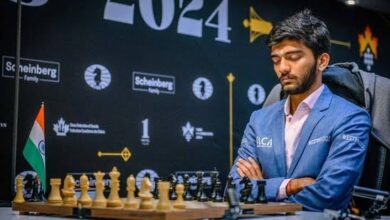Ashraf AboArafe
The former dictator once fought the Houthis, and later allied with them. His decision to break with them again was his last
IT WAS an unceremonious end for an Arab leader who had dominated his country for decades. On December 4th Ali Abdullah Saleh, Yemen’s former dictator, was killed outside the capital Sana’a, which has been paralysed by a week of fighting. A video circulated online showed his bloodied body wrapped in a blanket, surrounded by militiamen. State television called the former president “the leader of the traitors”. His death is likely to escalate a three-year civil war that has laid waste to the country. It was also a microcosm of Yemen’s complexity: Mr Saleh was killed by former foes who had become allies, only to become enemies again.
Mr Saleh, 75, was a military man who took control of North Yemen in 1978, then led the civil war that reunified the divided country in 1994. During a rule of over two decades, he and his allies were accused of plundering billions from the Arab world’s poorest state. He also fought a vicious war against the Houthis, a group including a large number of Zaidi Shia Muslims, who felt marginalised by the government. Mr Saleh faced mass protests in 2011, during the Arab spring, and survived an assassination attempt that left him severely burned. The Gulf states finally forced him out the following year and replaced him with his vice-president, Abd Rabbo Mansour Hadi.
A United Nations-backed political transition soon floundered, in part because the Houthis still felt disenfranchised. In late 2014 their fighters stormed Sana’a, to the relief of many frustrated with Mr Hadi’s inept rule. They also found an unlikely alliance in Mr Saleh, who saw a way back to political relevance. Within six months their forces had reached the southern port city of Aden. But the Houthis also proved terrible at governing—and their success prompted an intervention by Saudi Arabia, which has long meddled with its southern neighbour.
For more than two years a Saudi-led coalition has battered Yemen with air strikes. At least 10,000 people have been killed, most of them civilians. Disease and hunger have become widespread. The conflict has become another front in the proxy war between Saudi Arabia and Iran, which provides limited support to the Houthis. For all its military might, the Saudi-led coalition has struggled to defeat a much weaker foe. Twice in the past month, the Houthis even managed to launch ballistic missiles at Saudi Arabia. (Both were intercepted.)
Mr Saleh commanded a network of tribal fighters. Last week he suddenly ended his three-year partnership with the Houthis. Backed by Saudi warplanes, his men captured large parts of the capital. In a televised speech on December 2nd, Mr Saleh condemned the “recklessness” of his former Houthi allies and called for a dialogue with the Saudi-led coalition. But within days he suffered a dramatic reversal. The Houthis recaptured most of the territory they lost and besieged the area around the ex-president’s home, which they later blew up. More than 120 people were killed in Sana’a over the past week, according to the Red Cross. The former president was one of them.
His death is an embarrassment for Saudi Arabia, particularly the young crown prince, Muhammad bin Salman, who has suffered a string of recent foreign policy failures. It will probably open a new front in the war, between the Houthis and Mr Saleh’s tribal loyalists, the latter of whom now lack a leader. Mr Saleh’s son, Ahmed, is close to the United Arab Emirates, and may seek to fill his father’s shoes, keeping the fighters on the coalition’s side. So might General Ali Mohsen al-Ahmar, a onetime Saleh loyalist who now serves as Mr Hadi’s vice-president. But the most likely outcome is an even more splintered battlefield. Further misery lies ahead for Yemen’s 28m people, three-quarters of whom need humanitarian aid. Mr Saleh once compared ruling Yemen to “dancing on the heads of snakes.” In the end, even this consummate political survivor could not avoid being bitten.





